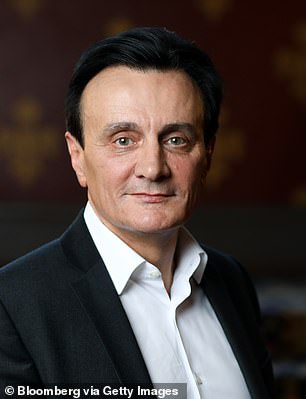<!–
<!–
<!– <!–
<!–
<!–
<!–

Higher earner: boss Pascal Soriot
AstraZeneca’s successful lung cancer drug increases patients’ chances of survival, the pharmaceutical giant said yesterday.
In a bull’s eye for the FTSE 100 group, a study showed that Imfinzi showed promise in treating highly aggressive small cell lung cancer.
AstraZeneca said the study showed a “statistically significant and clinically meaningful improvement” in patient survival.
It comes as a shareholder revolt builds over plans to pay AstraZeneca boss Pascal Soriot £18.9 million this year. The French-born businessman secured his biggest ever pay packet last year: £16.9m – the fifth year in a row he has earned more than £15m.
Investors have been urged to block the ‘excessive’ pay deal at next week’s annual general meeting.
But Soriot, 64, is credited with turning around the London-listed drugmaker’s fortunes – causing the company’s share price to triple since he took over in 2012.
Soriot also fought off a hostile takeover attempt by US rival Pfizer in 2014 and refocused the company on areas such as oncology.
Cancer treatments including Imfinzi – which is already approved for non-small cell lung cancer – accounted for 40 percent of AstraZeneca’s sales last year. Developing blockbuster drugs is crucial for pharmaceutical companies as patents on older treatments run out. And AstraZeneca is in the process of a buyout to strengthen its pipeline.
Last month it bought cancer treatment specialist Fusion Pharmaceuticals for £1.9 billion.
Since December, the rare disease-focused company has bought Amolyt Pharma for £800 million, cancer therapy company Gracell for £950 million and vaccine developer Icosavax for £900 million.
Dan Coatsworth, investment analyst at broker AJ Bell, said “pharmaceutical companies can never stand still” because “the pipeline has to stay filled.”
“AstraZeneca has spent £2.8 billion on two companies in the last four weeks alone to fill its ever-important pipeline of treatments that will boost profits in the future,” he said.
Imfinzi is already approved for the treatment of non-small cell lung cancer. AstraZeneca’s executive vice president of oncology research and development, Susan Galbraith, said the results of the study were “exciting.”
Sheena Berry of investment manager Quilter Cheviot said the results were a “testament to the company’s strategic focus on oncology”.
